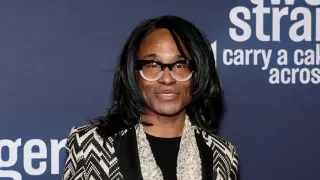January 10, 2024
Au Revoir, 'Julia' – Max Cancels Julia Child Homage After Second Season
READ TIME: 7 MIN.
The Hollywood Reporter reported earlier in the week the same fate hit the same streamer's "Our Flag Means Death." The pirate comedy, which many have called the queerest on television, aired its second season finale in October. And then there's the sad fate of "Minx," a show that debuted on Max and was cancelled after one season only to be brought back by Starz. The second season of this saucy look into 1970s porn mag publishing continued in its well-reviewed second season; then the show got the axe on January 5.
Perhaps "Julia's" showrunners knew the show would have a short shelf life because its finale, which aired on December 21, sweetly brought the story to a close. While some plot lines remained open, "Julia" ended on a satisfying, heartfelt note. Perhaps it was too twee for success; but that was part of its charm. That, and its stellar cast, led by the remarkable Sarah Lancashire, who not only embodied Child's imposing physical stature and sing-songy voice, but also the spirit and determination that made her public television's first superstar.
If "Julia" captures the 1960s vibe so well, right down to its impeccable production design and cultural references, that may be due to the fact it was co-produced by Daniel Goldfarb, who produced the equally eye-catching "The Marvelous Mrs. Maisel." Central to both shows is a strong woman making headway in a male-dominated culture; but while "Maisel" became a streaming phenomenon, there's been little love for "Julia," even for Sara Lancashire's inspired portrayal, which has been ignored during awards season. Along with Lancashire, the delightful cast includes David Hyde-Pierce, Bebe Neuwirth, Brittany Bradford, Fran Kranz, and Fiona Glascott, and guests stars Isabella Rossellini, Judith Light, and an unrecognizable Hannah Einbinder,
Much of the show's comedy rests with its portrayal of the behind-the-scenes goings on of a low-rent television station, and may have been played with slightly over-the-top silliness; but, at its best, "Julia" underscored what a pioneering figure its titular character was in the development of public television, and how she did so by being authentic to herself.
Its plot followed Child's early days at WGBH in Boston, when public television was struggling to find its voice and funding. Along the way the show hit on issues regarding racism and feminism and, at the end of Season Two, gay themes. That came with a plot meme surrounding Paul Child, Julia's husband. He had been dismissed from diplomatic service for homosexuality. At the start of Season Two, Julia is approached by an FBI agent to inform on left-leaning activity at Channel 2; the agent promises to reveal Paul's homosexuality if she doesn't cooperate, In the end, Julia stands up to the FBI, but Paul's dismissal and Julia's blackmail reflect how many gays were treated in pre-Stonewall America. And David Hyde Pierce gave Paul Child a quiet dignity, most tellingly in that final episode, when he spoke of his past with no shame to the blackmailer.
It isn't likely that Child was blackmailed, and in real life she wasn't such the liberal icon seen on the show. She would drop homophobic terms, such as "pedal" or "pedalo" – French vernacular for gay. "Homophobia was a socially acceptable form of bigotry in midcentury America, and Julia and Paul participated without shame for many years," wrote Child's biographer Laura Shapiro in her 2007 book "Julia Child," an excerpt from which was published in Boston Magazine. After a trip to San Francisco, Shapiro noted, Child complained that the city was full of pedals – "It appears that SF is their favorite city! I'm tired of them, talented though they are."
Nor was the burgeoning women's movement part of her agenda. The show referenced this when Betty Friedan chided Child for her success pushing women back in the kitchen; but unlike Lancashire on the show, who was stunned by the remark, the real Child spoke openly against female equality, most tellingly in public spaces. "[W]hen clubs and restaurants that excluded women came under pressure from feminists to change their policies, Julia sided with the men," Shapiro wrote. "'I am very much against the new policy at the Ritz of allowing unaccompanied women into the Grill,' she told an audience at the all-male St. Botolph Club in Boston in 1978, where she had been invited to give a talk. 'They'll turn it into a clacking hen house sure enough, and then no one will want to go there. So, stick to your guns, gentlemen.'"
Child even credited her television success to men. "Thank heaven for the men in our TV audience," Shapiro documents her remarking in 1966. "They are responsible for stimulating interest in cooking. The women would just pass it over."
But Child wasn't blind to prejudice. She famously championed female chefs, funding scholarships and mentoring them, and fought for their acceptance in a male-dominated field.
And even if she didn't understand homosexuality, when some friends began dying from AIDS in the 1980s, her prejudices shattered. Shapiro reported how Child attended a 1986 AIDS benefit in Boston Garden, where she told the crowd: "Last year my husband and I stood by helplessly while a dear and beloved friend went through months of slow and frightening agony. But what of those lonely ones? The ones with no friends or family to ease the slow pain of dying? Those are the people we're concerned about this evening. And food is of very special importance here. Good food is also love."
"Julia" may have been a fanciful look at Julia Child's life, but it was smart and fun, and gave audience the opportunity enjoy Sarah Lancashire 's phenomenal performance. She will be missed.






